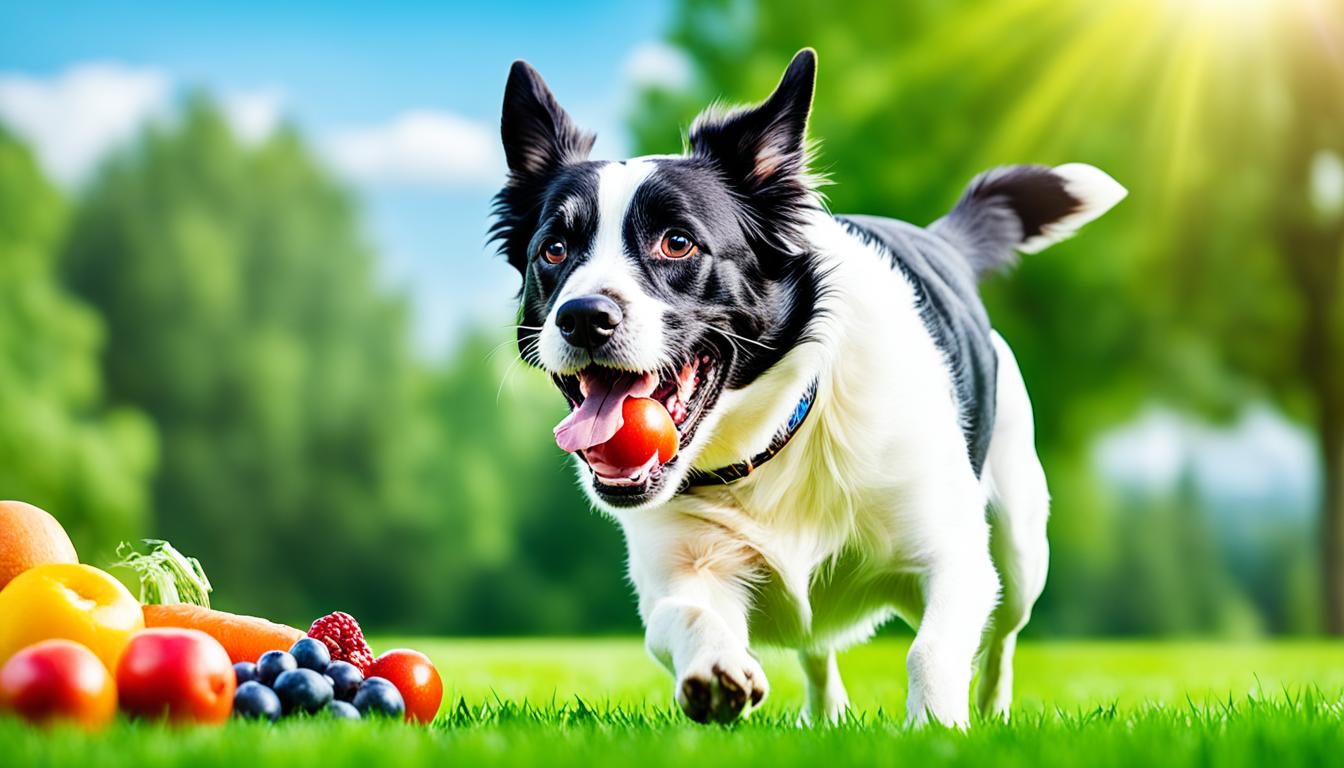Feeding your pet a balanced diet is crucial for their overall health and wellness. The food you choose for your pet has a direct impact on their overall well-being and can significantly improve the quality and longevity of their life. A balanced diet ensures that your pet receives the necessary nutrients they need to thrive and prevent health problems. It provides essential vitamins, minerals, proteins, carbohydrates, and fats that support their vitality and strengthen their immune system. By prioritizing a balanced diet for your pet, you can promote a healthier coat, stronger bones, improved energy levels, better digestion, and a happier temperament.
Key Takeaways:
- A balanced diet is essential for your pet’s overall health and wellness.
- It provides the necessary nutrients for a healthier coat, stronger bones, and improved energy levels.
- Prioritizing a balanced diet can strengthen your pet’s immune system and promote better digestion.
- Choosing high-quality ingredients ensures your pet receives the essential vitamins, minerals, proteins, carbohydrates, and fats they need.
- Consulting with your veterinarian can help you create a balanced diet plan tailored to your pet’s individual needs.
The Direct Impact of Diet on Your Pet’s Health
Your pet’s diet has a direct impact on their overall health, just as it does for humans. A poor diet lacking in essential nutrients can lead to a range of health issues, including obesity, allergies, digestive problems, and a weakened immune system. On the other hand, a balanced diet filled with high-quality ingredients provides the necessary nutrients to support your pet’s vitality and prevent health problems. It can improve their coat and skin condition, maintain healthy teeth and gums, promote proper growth and development, and increase their energy levels. Additionally, a well-balanced diet can help manage weight, reduce the risk of chronic diseases, and support their overall well-being.
By prioritizing your pet’s diet and incorporating pet health tips, you can ensure their well-being and longevity. Providing them with a nutritionally balanced diet that includes the right proportions of proteins, carbohydrates, fats, vitamins, minerals, and water is essential. Proper nutrition strengthens their immune system, boosts their energy levels, and improves their physical appearance. Here are some pet wellbeing tips to help you optimize your pet’s diet:
1. Choose high-quality pet food: Look for pet food formulated with high-quality ingredients and without unnecessary fillers or artificial additives. Read the ingredient list and prioritize whole food sources.
2. Provide fresh water: Ensure your pet has access to clean and fresh water at all times. Hydration is crucial for their overall health and proper bodily functions.
3. Feed appropriate portion sizes: Overfeeding can lead to obesity and other health issues. Consult with your veterinarian to determine the right portion sizes for your pet’s specific needs.
4. Include a variety of nutrients: Incorporate a range of proteins, carbohydrates, and healthy fats into your pet’s diet to ensure they receive a diverse array of nutrients.
5. Consult with your veterinarian: Your veterinarian is your best resource for personalized advice on your pet’s specific dietary needs. They can guide you in choosing the right food and supplements for your pet.
By following these pet health tips and providing a well-balanced diet, you can take proactive steps to support your pet’s overall health and well-being. Remember, every pet is unique, so it’s important to tailor their diet to their specific needs and consult with a professional for guidance.
| Pet Health Tips | Purpose |
|---|---|
| Choose high-quality pet food | To ensure the intake of essential nutrients |
| Provide fresh water | To maintain proper hydration and bodily functions |
| Feed appropriate portion sizes | To prevent obesity and weight-related health issues |
| Include a variety of nutrients | To provide a diverse range of essential vitamins and minerals |
| Consult with your veterinarian | To receive personalized advice and ensure your pet’s specific dietary needs are met |
Hydration: The Foundation of Pet Nutrition
Water is the foundation of pet nutrition and plays a crucial role in maintaining their overall health. Just like humans, pets need access to clean and fresh water at all times. More than half of your pet’s total body percentage consists of water, making hydration vital for their well-being.
The Importance of Water for Pets
Water serves multiple essential functions in your pet’s body:
- Regulates body temperature
- Aids in digestion
- Transports nutrients
- Flushes out toxins
- Lubricates joints
Without a proper supply of water, pets can experience dehydration, which can lead to serious health problems. It is crucial to ensure that your pet drinks enough water to stay properly hydrated.
How to Ensure Adequate Water Intake
To help your pet maintain adequate water intake, follow these tips:
- Provide clean water sources: Make sure your pet has access to clean and fresh water at all times. Clean their water bowls regularly to prevent bacterial growth.
- Place water bowls in easily accessible locations: Position water bowls in areas where your pet spends most of their time to encourage drinking.
- Monitor water intake: Observe your pet’s water consumption and ensure they are drinking enough. The amount of water needed can vary depending on factors such as age, size, activity level, and weather conditions.
- Consult your veterinarian: If you notice any signs of dehydration, such as dry gums, lethargy, or decreased urination, consult your veterinarian for guidance.
By prioritizing pet hydration, you can help maintain their health and prevent dehydration-related issues.
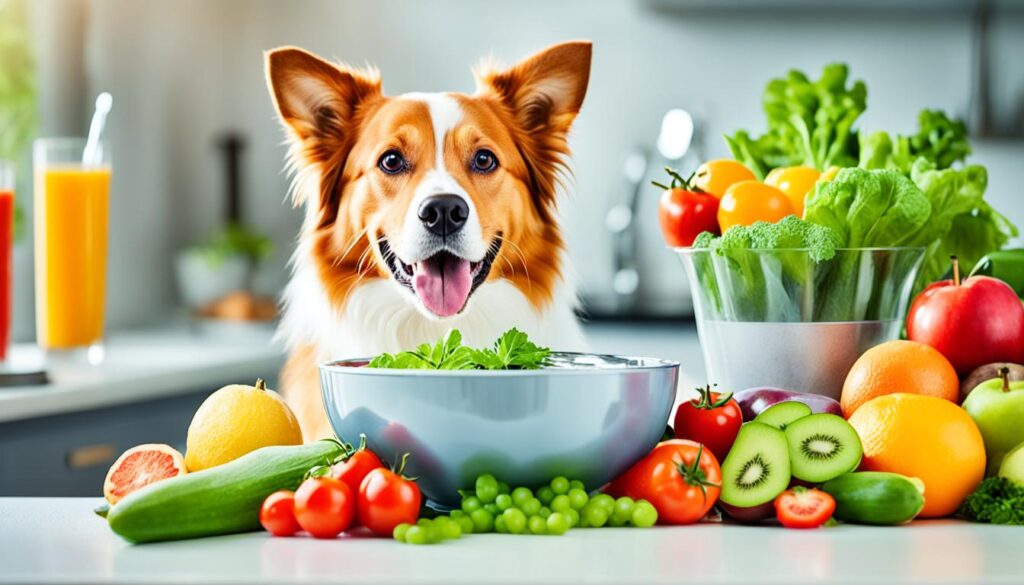
Carbohydrates in Pet Food: Energy for Growth
Carbohydrates are an essential component of a balanced diet for pets as they provide energy for growth and daily activities. Most pet foods, especially dry foods, contain a certain percentage of carbohydrates. However, it is essential to consider the quality and source of carbohydrates in their diet.
Carbohydrates derived from whole grains, vegetables, and fruits are healthier options for pets as they also provide valuable fiber. These complex carbohydrates are slowly digested, providing a steady release of energy throughout the day. Additionally, fiber aids in digestion and helps maintain a healthy weight.
While carbohydrates are necessary for your pet’s well-being, it is crucial to avoid excessive consumption. Overconsumption of carbohydrates can lead to weight gain and obesity in pets. Proper portion control is essential, as each pet’s carbohydrate requirements may vary depending on factors such as age, size, activity level, and overall health.
Choosing high-quality carbohydrate sources is also important. Look for pet foods that include whole grains like brown rice or oats, as well as vegetables and fruits. These sources not only provide energy but also important vitamins, minerals, and antioxidants that contribute to your pet’s overall health and well-being.
When considering your pet’s diet, it is recommended to consult with your veterinarian to determine the optimal amount and sources of carbohydrates. They can provide personalized guidance based on your pet’s specific nutritional needs and help you create a balanced diet plan to support their growth and overall well-being.
Fats: Essential Energy for Healthy Skin and Coats
Fats are a crucial component of your pet’s diet as they provide essential energy and support healthy skin and coats. Including healthy fats in your pet’s diet is important to ensure their overall well-being and promote optimal health. Good sources of healthy fats for pets include fish, chicken, meat, oils, and some plant-based fats. These fats are rich in omega-3 and omega-6 fatty acids, which play a significant role in promoting healthy skin, a shiny coat, and a robust immune system in pets.
Balancing fats with other essential nutrients is key to maintaining a healthy body condition in your pet. While fats provide essential energy, excessive fat consumption can lead to weight gain and obesity. It is crucial to consult with your veterinarian to determine the appropriate amount and sources of fats for your pet’s specific needs. They can guide you in creating a well-rounded diet that provides the right balance of fats, proteins, carbohydrates, vitamins, and minerals to support your pet’s overall health and longevity.
Sources of Healthy Fats for Pets
When it comes to including healthy fats in your pet’s diet, here are some excellent sources:
- Fish: Fish such as salmon, mackerel, and sardines are rich in omega-3 fatty acids, which can improve your pet’s skin health and coat condition.
- Chicken: Chicken is a lean protein source that also provides healthy fats, promoting your pet’s overall well-being.
- Meat: Lean meats like beef, turkey, and lamb are good sources of healthy fats that can support your pet’s skin and coat health.
- Oils: Omega-3 oils, such as fish oil or flaxseed oil, can be added to your pet’s diet to provide additional healthy fats.
- Plant-based fats: Some plant-based fats, including avocados and coconut oil, can also be beneficial for your pet’s skin and coat health.
Balancing Fats with Other Nutrients
While fats are important for your pet’s health, it is crucial to offer a balanced diet that includes other essential nutrients as well. Here are some ways to ensure a proper balance:
- Proteins: Include high-quality protein sources in your pet’s diet, such as lean meats or specific pet food formulas that prioritize protein content.
- Carbohydrates: Provide carbohydrates from sources like whole grains, vegetables, and fruits to ensure a well-rounded diet.
- Vitamins and minerals: Include a variety of fruits and vegetables to supply the necessary vitamins and minerals your pet needs.
By maintaining a balanced diet that includes appropriate amounts of fats, proteins, carbohydrates, vitamins, and minerals, you can ensure your pet’s skin and coat health as well as their overall well-being.
Vitamins and Minerals: Boosting Immunity in Pets
Vitamins and minerals are essential for maintaining your pet’s overall health and boosting their immune system. These crucial nutrients support various bodily functions and ensure proper metabolism, strong bones, and healthy blood cells.
Key Vitamins for Pet Metabolism
Vitamins play a vital role in energy production, cell function, and immune system support in pets. Here are some key vitamins that are important for your pet’s metabolism:
- Vitamin A: Supports vision, growth, and immune function.
- Vitamin B: Contributes to energy production and overall cell health.
- Vitamin C: Acts as an antioxidant, strengthens the immune system, and aids in collagen production.
- Vitamin D: Essential for calcium absorption and bone health.
- Vitamin E: Protects cells from oxidative damage and supports immune function.
Essential Minerals for Strong Bones and Blood Health
Minerals are vital for maintaining strong bones, healthy blood cells, and overall well-being in pets. Here are some essential minerals that your pet needs:
- Calcium: Supports bone and teeth development, muscle function, and blood clotting.
- Iron: Necessary for the production of healthy red blood cells.
- Zinc: Aids in immune system function, cell growth, and wound healing.
A balanced diet that includes a variety of high-quality ingredients can provide these essential vitamins and minerals for your pet. However, it is important to consult with your veterinarian to ensure that your pet’s diet meets their specific nutritional needs.
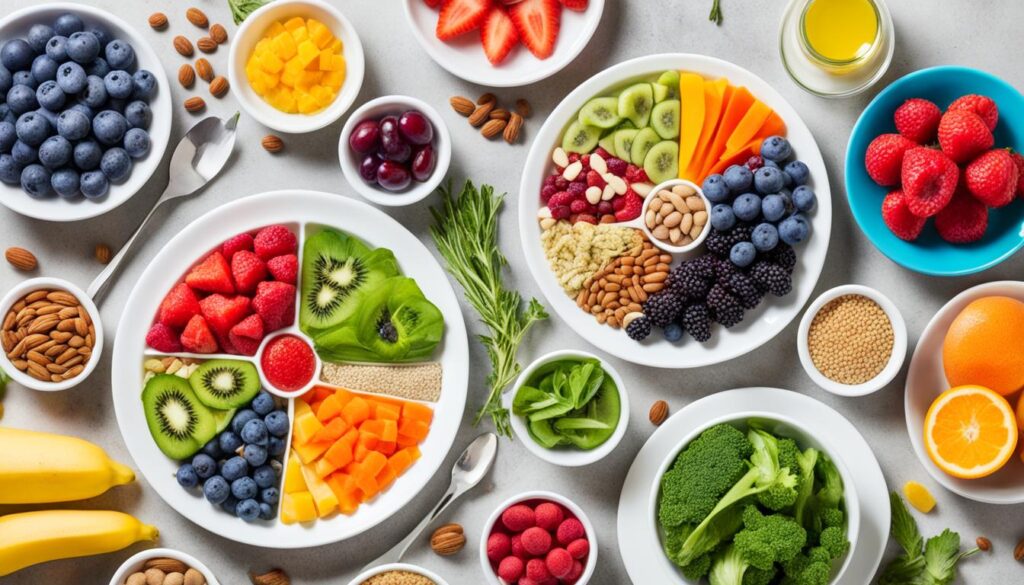
Homemade vs. Commercial Pet Foods: Weighing Your Options
When it comes to choosing the right food for your pet, you have the option of homemade or commercial pet foods. Homemade pet food allows you to have full control over the ingredients and quality of the food you provide. However, it requires careful planning to ensure your pet receives a properly balanced diet with all the necessary nutrients.
On the other hand, commercial pet foods undergo rigorous testing and research to meet the nutritional needs of pets. They often provide a balanced combination of vitamins, vegetables, grains, and meat.
Both homemade and commercial pet foods have their pros and cons, and the best choice depends on your pet’s specific needs, lifestyle, and any dietary restrictions. Consulting with your veterinarian can help you determine the feeding option that suits your pet’s individual requirements.
Please take a look at the image below for a visual comparison between homemade and commercial pet foods:
| Homemade Pet Food | Commercial Pet Food |
|---|---|
| Provides full control over ingredients | Rigorously tested and researched |
| Requires careful planning for balanced nutrition | Offers a balanced combination of nutrients |
| May be suitable for pets with specific dietary needs | Wide range of options for different pet requirements |
| Time-consuming to prepare | Convenient and ready-to-serve |
| Potential for ingredient variability | Consistent nutrient content |
By carefully considering the advantages and disadvantages of both options and seeking professional guidance, you can make an informed decision about the best diet for your beloved pet.
Pet Health and Wellness Tips: Balanced Diet Essentials
Understanding the essentials of a balanced diet is crucial for your pet’s health and wellness. A balanced diet provides the necessary nutrients that support their overall well-being and contribute to a healthier and happier life. Let’s explore the key components of a balanced pet diet and how they contribute to their overall health.
Understanding Proteins, Carbs, and Fats
Proteins play a vital role in your pet’s diet as they are the building blocks of muscles, organs, and tissues. Including high-quality animal protein sources such as chicken, beef, or fish in their diet ensures proper muscle development, organ function, and overall growth.
Carbohydrates are an important source of energy for your pet. They provide the fuel needed for their daily activities and support optimal bodily functions. Good sources of carbohydrates include whole grains, vegetables, and fruits. They also provide valuable fiber, which aids in digestion and promotes overall gut health.
Fats are high-energy nutrients that are essential for your pet’s health. They play a crucial role in maintaining healthy skin and coat condition, as well as supporting their immune system. Including healthy fats from sources like fish, chicken, or plant-based oils can provide the necessary fatty acids, such as omega-3 and omega-6, that promote skin health, coat shine, and overall well-being.
The Role of Micronutrients in Pet Diets
While proteins, carbohydrates, and fats are the macronutrients that form the foundation of your pet’s diet, micronutrients are equally important for their overall health. Micronutrients refer to vitamins and minerals, which are essential for various bodily processes and overall metabolism.
Vitamins, such as A, B, C, D, and E, are crucial for your pet’s immune system function, energy production, and cell function. They support overall growth, repair, and general well-being. Including a variety of nutrient-rich foods in your pet’s diet can ensure they receive an adequate intake of vitamins.
Minerals, such as calcium, iron, and zinc, are necessary for strong bones, healthy blood cells, and overall bodily functions. These minerals play a crucial role in supporting your pet’s growth, maintaining their health, and preventing deficiencies.
By ensuring a balanced intake of proteins, carbohydrates, fats, vitamins, and minerals, you can provide your pet with the essential nutrients they need to thrive. However, it’s important to consult with your veterinarian to determine the specific dietary requirements of your pet based on their breed, age, activity level, and any pre-existing health conditions. A well-balanced diet tailored to their individual needs can contribute to their overall health and wellness.
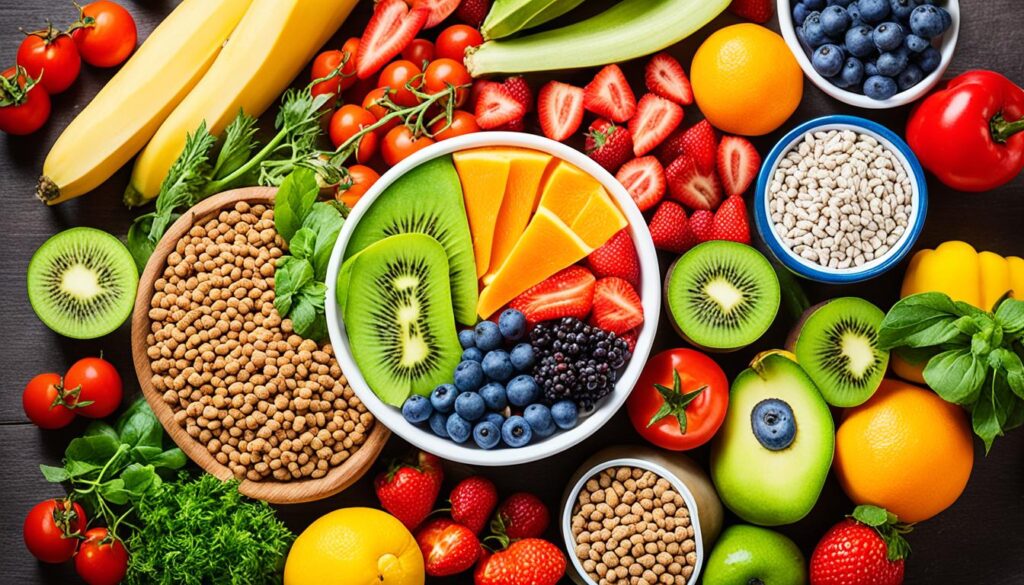
Decoding Pet Food Labels for Optimal Nutrition
Decoding pet food labels is essential for understanding the nutritional content and quality of the food you are feeding your pet. Reading and interpreting ingredient lists can give you valuable insights into the composition of the food and the sources of its nutrients.
Reading and Interpreting Ingredient Lists
When analyzing pet food labels, it’s important to pay attention to the ingredient list. Ingredients are listed in descending order of weight, with the first few ingredients being the most significant. Look for high-quality protein sources listed as primary ingredients. These could include named meats or meat meals, which are concentrated sources of protein.
Avoid foods that contain excessive amounts of fillers or artificial additives. Fillers, such as wheat, corn, or soy, provide little nutritional value and can be difficult for pets to digest. Artificial additives, such as colors, flavors, or preservatives, may have negative effects on your pet’s health.
For example, a high-quality pet food may list the first ingredient as “chicken meal” or “salmon,” indicating that it contains a significant amount of animal-based protein. On the other hand, a lower-quality pet food may list “corn” or “wheat” as the main ingredient, signifying a higher amount of fillers.
The Significance of AAFCO Standards
Another important factor to consider on pet food labels is the Association of American Feed Control Officials (AAFCO) statement. This statement ensures that the food has been formulated to meet the nutritional needs of pets according to established standards. Look for wording such as “complete and balanced” or “formulated to meet the AAFCO nutrient profiles for [life stage].”
Familiarizing yourself with AAFCO standards and understanding how to read pet food labels can help you make informed choices for your pet’s optimal nutrition. By selecting foods with high-quality ingredients and appropriate nutrient profiles, you can provide your pet with the essential nutrients they need to thrive.
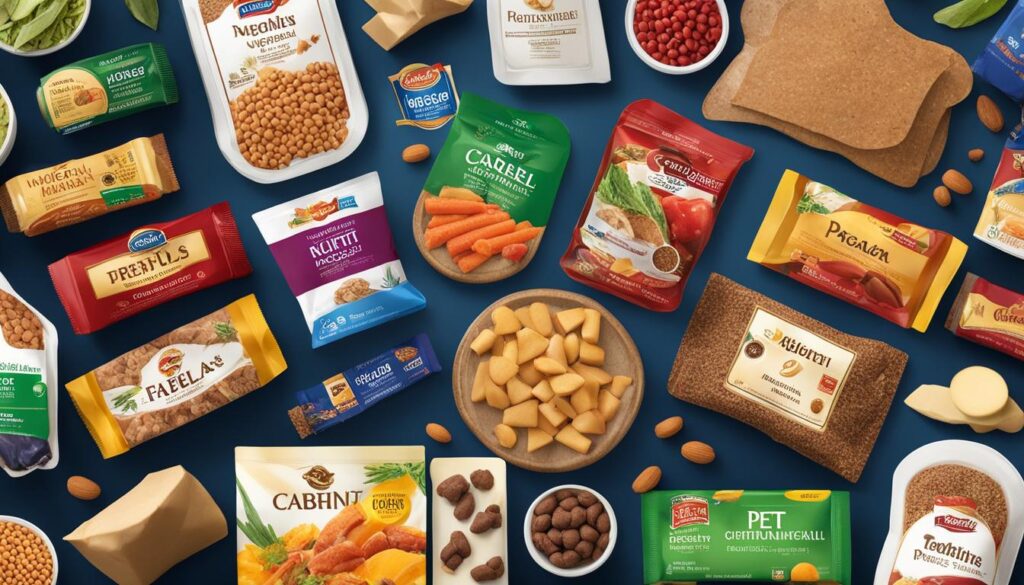
Lifestyle-Specific Nutrition: Tailoring Your Pet’s Diet
Tailoring your pet’s diet to their specific lifestyle is essential for their overall health and well-being. Different pets have different dietary requirements based on factors such as age, activity level, breed, and any pre-existing health conditions.
For example, a highly active dog may require a diet higher in protein and energy to support their physical exertion. On the other hand, a senior cat may benefit from a diet that supports joint health and digestive comfort.
Understanding your pet’s lifestyle and consulting with your veterinarian can help you make the necessary adjustments to their diet to ensure optimal nutrition and support their unique needs.
When considering lifestyle-specific pet diet choices, it’s important to consider the following:
- Age: Puppies and kittens have different nutritional needs than adult or senior pets. Adjust their diet accordingly to support their growth and development.
- Activity Level: Highly active pets may require diets that provide more protein and energy to sustain their active lifestyles. On the other hand, less active pets may benefit from reduced calorie intake to maintain a healthy weight.
- Breed: Some breeds have specific dietary requirements. For example, large breed dogs may need diets that support joint health, while smaller breeds may require smaller kibble sizes.
- Pre-existing Health Conditions: Pets with certain health conditions may require specialized diets. Consult with your veterinarian to understand the appropriate dietary adjustments to support their specific needs.
By tailoring your pet’s diet to their unique lifestyle and dietary requirements, you can ensure they receive the optimal nutrition they need for a long, healthy, and happy life.
Pet Nutrition Throughout Different Life Stages
Dietary Needs from Puppies and Kittens to Seniors
Pets have varying nutritional needs throughout different life stages. Puppies and kittens, in particular, require a diet that is rich in essential nutrients to support their growth and development. Providing them with the right balance of proteins, carbohydrates, fats, vitamins, and minerals is crucial during these formative years. A diet specifically formulated for puppies and kittens can ensure they receive the necessary nutrients to build strong bones, develop a healthy immune system, and support their overall well-being.
As pets enter their senior years, their dietary needs change once again. Senior pets may benefit from diets that focus on joint support, cognitive function, and overall vitality. Providing them with appropriate nutrition can help manage age-related conditions, such as arthritis and cognitive decline, and maintain their quality of life. Senior-specific pet foods are often formulated with higher levels of antioxidants, joint-supporting ingredients, and lower calorie content to support the unique needs of aging pets.
Special Diets for Nursing or Pregnant Pets
Nursing or pregnant pets have specific dietary requirements to support the health of both the mother and her offspring. During pregnancy and lactation, pets require increased energy, protein, and other essential nutrients to support fetal development and milk production. It is important to provide a high-quality, balanced diet that meets the increased nutritional demands of these life stages. Consulting with your veterinarian can help ensure that your pet’s diet is appropriately adjusted to meet their unique needs during this crucial time.
Understanding the specific dietary needs of your pet throughout different life stages is essential for providing them with optimal nutrition. Consulting with your veterinarian and choosing age-appropriate formulas or specialized diets can help ensure your pet receives the necessary nutrients for their specific life stage.
Conclusion
A balanced diet is the foundation of your pet’s health and wellness. By providing them with a nutritionally complete and balanced diet, you can promote their overall well-being, strengthen their immune system, and prevent a range of health problems.
Understanding the importance of key nutrients such as proteins, carbohydrates, fats, vitamins, minerals, and water can help you make informed choices for your pet’s nutrition. These nutrients are essential for their growth, energy, and vital bodily functions.
Whether you choose homemade or commercial pet foods, it is crucial to prioritize their specific dietary needs and consult with your veterinarian. They can provide valuable guidance tailored to your pet’s unique requirements and help you make the best decisions for their health.
By taking proactive steps to ensure your pet receives a balanced diet, you can contribute to their longevity, happiness, and overall quality of life. Investing in their nutrition not only improves their physical well-being but also enhances their coat, teeth, digestion, and mental state.
FAQ
What are the benefits of a balanced diet for my pet’s health?
Feeding your pet a balanced diet is crucial for their overall health and wellness. It provides essential nutrients that support their vitality, strengthen their immune system, promote a healthier coat, stronger bones, improved energy levels, better digestion, and a happier temperament.
How does diet directly impact my pet’s health?
Your pet’s diet has a direct impact on their overall health. A poor diet lacking essential nutrients can lead to a range of health issues, while a balanced diet filled with high-quality ingredients can improve coat and skin condition, teeth and gum health, promote proper growth and development, and increase energy levels.
Why is water important for pets?
Water is the foundation of pet nutrition and plays a crucial role in maintaining their overall health. It helps regulate body temperature, aids in digestion, transports nutrients, flushes out toxins, and lubricates joints.
How can I ensure my pet drinks enough water?
Ensure your pet has access to clean and fresh water at all times, and place water bowls in easily accessible locations. Monitor their water intake and consult your veterinarian if you notice signs of dehydration.
Why are carbohydrates important in pet food?
Carbohydrates provide energy for growth and daily activities. They are a valuable source of fiber and are necessary for a balanced diet.
What are healthy sources of fats for pets?
Good sources of healthy fats for pets include fish, chicken, meat, oils, and some plant-based fats. These fats are rich in omega-3 and omega-6 fatty acids, which promote healthy skin, a shiny coat, and a robust immune system.
Why are vitamins and minerals important for my pet’s health?
Vitamins and minerals support various bodily functions and are crucial for proper metabolism, strong bones, and blood health. They boost your pet’s immunity and contribute to their overall well-being.
Should I choose homemade or commercial pet food?
Both options have pros and cons. Homemade pet food allows you to have control over ingredients and quality, while commercial pet food undergoes rigorous testing and meets nutritional needs. Consider your pet’s specific needs and consult with your veterinarian before making a decision.
What are the essentials of a balanced diet for pets?
A balanced diet for pets includes proteins, carbohydrates, fats, vitamins, and minerals. These nutrients support essential bodily functions, growth, and overall well-being.
How can I decode pet food labels for optimal nutrition?
Read ingredient lists to understand the composition and sources of nutrients. Look for high-quality protein sources and avoid excessive fillers or artificial additives. Pay attention to the AAFCO statement on the label, which ensures it meets nutritional standards.
Should I tailor my pet’s diet to their lifestyle?
Yes, tailoring your pet’s diet to their specific lifestyle is essential. Factors such as age, activity level, breed, and health conditions influence their dietary requirements.
How does pet nutrition differ throughout different life stages?
Pets have varying nutritional needs at different life stages. Puppies and kittens require diets rich in essential nutrients, while seniors may benefit from diets supporting joint health. Nursing or pregnant pets have specific requirements to support both them and their offspring.
Why is a balanced diet important for pet health?
A balanced diet is the foundation of your pet’s health and wellness. It promotes overall well-being, strengthens the immune system, and prevents a range of health problems. Providing optimal nutrition contributes to their longevity, happiness, and quality of life.
Source Links
- https://brawleyanimal.com/5-facts-about-the-importance-of-feeding-your-pet-a-balanced-diet/
- https://www.kankakeeanimal.com/blog/the-importance-of-nutrition-for-your-pets-health.html
- https://chattanoogaspecialty.vet/importance-of-good-diet/

